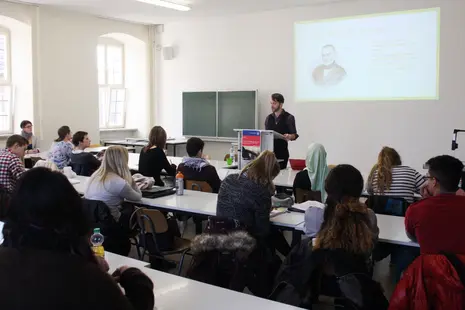Kellen Bolt (Northwestern University, USA): "The Art of Plantation Management: Race, Risk, and Swamp Ecologies in Charles Sealsfield's Immigrant Nature Writing"
Thursday, 8.12.2016, 10:15 - 11:45, U5/02.22
Throughout the early and mid-nineteenth century, immigrant guidebooks to the United States deem the South too expensive and too unhealthy for prospective citizens to settle. Even if they possessed the capital to build and to maintain a plantation, European immigrants seem to lack the ecological sensibilities and bodily constitutions necessary to Americanize the chaotic, foreign-seeming swamps without dying. Despite these dire warnings, the ecologies of the southern United States animate a small segment of the German-American imagination, particularly in the works of the popular Austro-American novelist and travel writer, Karl Postl who is better known by his pseudonym: Charles Sealsfield. In this lecture, Kellen Bolt explored how Charles Sealsfield's immigrant guidebook, Americans as They Are (1828), and his plantation novel series, Lebensbilder aus der westlichen Hemisphare (1834-37), present Americanization as an art of plantation management. Comparing Sealsfield's works with guidebooks and novels about the South published in Germany and the U.S., he illustrated how Sealsfield's art of plantation management depends upon an ecological sensibility in which Southern swamps and bayous register as terrifying, Gothic spaces of death that need to be Americanized through slave labor. Poisonous plants, infectious diseases, wildfires, tornados, and other factors associated with the South's climate expose the limits of human agency, especially planter sovereignty. These imminent threats of death propel Sealsfield's prospective citizens into a perpetual state of warfare against nature wherein the white planter must constantly calculate the risks to his plantation and his white supremacy. Through Sealsfield's fictional and non-fictional works, this lecture outlined how immigrant nature writing filters abstract, scientific descriptions of the south into more consumable narrative forms that not only circulate more widely but also create particular ways of understanding and interacting with American environments. In addition, Bolt analyzed the narrative techniques and literary modes through which issues of race and risk become inextricably intertwined in the immigrant environmental imagination.
Kellen Bolt is a fifth-year Ph.D. candidate at Northwestern where he specializes in 18th and 19th century American literature and politics, ecocriticism and environmental literature, immigrant literature and history, and Foucauldian theory. He is currently working on his dissertation, entitled "Cultivating Citizens: Ecology and Nationality in U.S. Immigrant Literature." Investigating the political and cultural functions of immigrant nature writing, it examines the political dimensions of environmental subjectivities and ethics within immigrant writing in order to rewrite standard scholarly accounts of naturalization and ecological citizenship. In addition to his research, Kellen Bolt has taught a wide range of classes on American literature from the colonial era to the twenty-first century.
